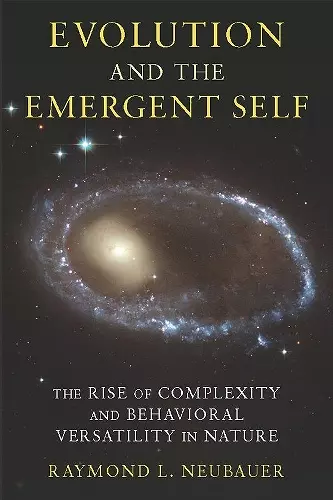Evolution and the Emergent Self
The Rise of Complexity and Behavioral Versatility in Nature
Format:Hardback
Publisher:Columbia University Press
Published:25th Nov '11
Currently unavailable, and unfortunately no date known when it will be back

A new history of humanity's place in nature, from the Big Bang to the present.
Evolution and the Emergent Self is an eloquent and evocative new synthesis that explores how the human species emerged from the cosmic dust. Lucidly presenting ideas about the rise of complexity in our genetic, neuronal, ecological, and ultimately cosmological settings, the author takes readers on a provocative tour of modern science's quest to understand our place in nature and in our universe. Readers fascinated with "Big History" and drawn to examine big ideas will be challenged and enthralled by Raymond L. Neubauer's ambitious narrative. How did humans emerge from the cosmos and the pre-biotic Earth, and what mechanisms of biological, chemical, and physical sciences drove this increasingly complex process? Neubauer presents a view of nature that describes the rising complexity of life in terms of increasing information content, first in genes and then in brains. The evolution of the nervous system expanded the capacity of organisms to store information, making learning possible. In key chapters, the author portrays four species with high brain:body ratios-chimpanzees, elephants, ravens, and dolphins-showing how each species shares with humans the capacity for complex communication, elaborate social relationships, flexible behavior, tool use, and powers of abstraction. A large brain can have a hierarchical arrangement of circuits that facilitates higher levels of abstraction. Neubauer describes this constellation of qualities as an emergent self, arguing that self-awareness is nascent in several species besides humans and that potential human characteristics are embedded in the evolutionary process and have emerged repeatedly in a variety of lineages on our planet. He ultimately demonstrates that human culture is not a unique offshoot of a language-specialized primate, but an analogue of fundamental mechanisms that organisms have used since the beginning of life on Earth to gather and process information in order to buffer themselves from fluctuations in the environment. Neubauer also views these developments in a cosmic setting, detailing open thermodynamic systems that grow more complex as the energy flowing through them increases. Similar processes of increasing complexity can be found in the "self-organizing" structures of both living and nonliving forms. Recent evidence from astronomy indicates that planet formation may be nearly as frequent as star formation. Since life makes use of the elements commonly seeded into space by burning and expiring stars, it is reasonable to speculate that the evolution of life and intelligence that happened on our planet may be found across the universe.
Raymond L. Neubauer ranges over much territory, not only in the biosciences but also beyond and into the physical sciences. Evolution and the Emergent Self is easy to read and accessible, yet technical enough to be of value to a wide spectrum of scientists and students. This book is a wonderful new contribution to an interdisciplinary field of growing interest. -- Eric Chaisson, Tufts University and Harvard University, author of Epic of Evolution: Seven Ages of the Cosmos Ever since the universe began to present itself to scientists as a story and not a mere state, it has sought skillful narrators with the vision to tell us what's really going on there. It has found one in Raymond L. Neubauer. Aware of how difficult it has been for modern thought to reconcile the dispassionate scientific study of nature with the pulse of personality, the author succeeds admirably in pulling off the needed synthesis. Neubauer--a rare combination of scientist, poet, and seer--weaves together the latest information from biology, chemistry, physics, cosmology, and other sciences in a readable and dramatically gripping way. His artful and scientifically rigorous rendition of the cosmic story cunningly reveals to readers how their own personal existence and aspirations are stitched seamlessly into a grand cosmic narrative. A lovely and enlightening book. -- John F. Haught, Georgetown University, author of Making Sense of Evolution: Darwin, God, and the Drama of Life ...fascinating, big-picture discussion... Library Journal It is an amazing, well-written account. Choice This is the ultimate handbook for a scientist of any type to gain an introduction to a variety of different areas of science and integrate them into his or her own perspective on the emergent self. PsycCritiques
ISBN: 9780231150705
Dimensions: unknown
Weight: unknown
336 pages